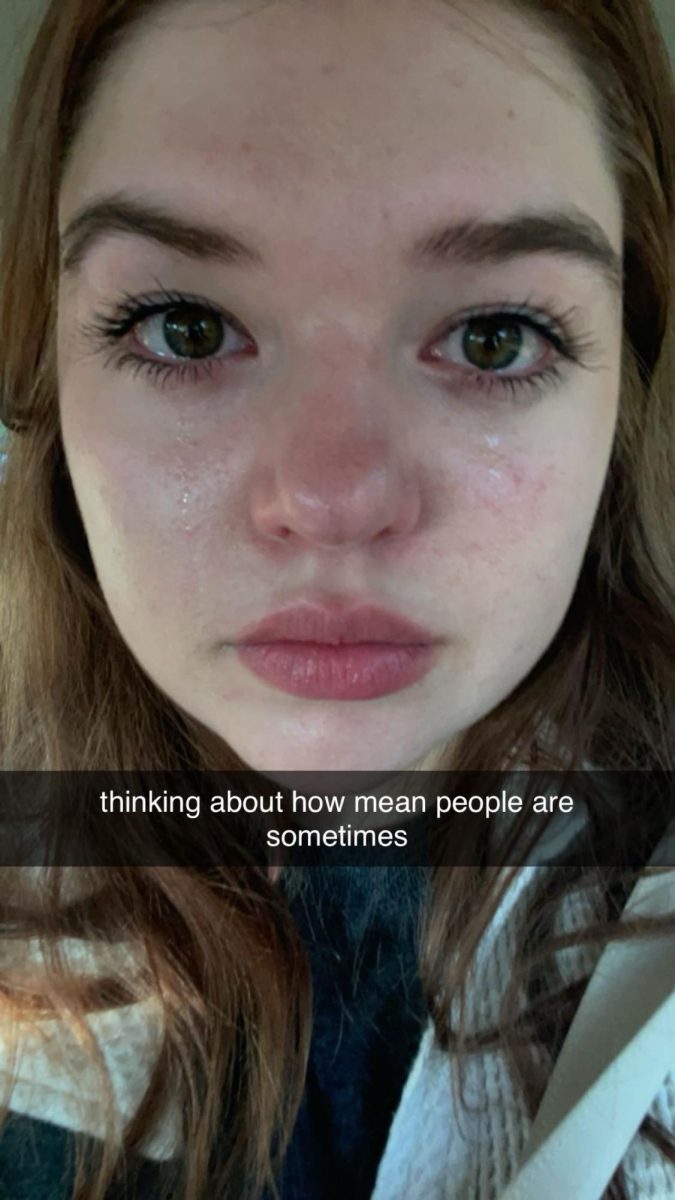I open TikTok, the sixth most popular social media platform worldwide. I see a girl using an audio with the words, “wanna see a magic trick, here go a salad. You big fat*ss b*tch you meat to meat, all you do is eat to eat …”
I scroll, and I see a pretty girl doing a “what I eat in a day” video. Her diet consists of rice cakes and gum. She is too beautiful to get hungry. She looks so happy and her clothes look so beautiful on her. I would give anything to be her.
I scroll once more and I see a transgender teenager making a lip sync video on an app made for lip syncing. The comments are nasty, calling her mentally ill and making fun of how she has an Adam’s apple.
I close the app. I go for a walk. I end up running until I get to an empty park. I run as my lungs set on fire. I run through it. I run until I can’t run any more. I end up in an empty field and think to myself: how did we get here?
A couple years ago, the world gave me hope. It seemed to be moving forward in accepting everyone, not just those who matched “normal” beauty standards. A few years ago, the trending songs were “Same Love” by Macklemore and “All About that Bass” by Meghan Trainor, both songs written about accepting and loving yourself and who you are. These songs aren’t trending anymore, and that manifests itself in peculiar ways.
Y2K aesthetic can be defined by low rise jeans, tiny tank tops, idolization of Paris Hilton, and tight crop tops. There are other elements to the aesthetic, but at surface level this is basically it.
Although the trend started innocently, it soured swiftly. I started noticing an accessory that all of the popular Y2K icons had on TikTok. An accessory that I longed to have. They were skinny. Not just skinny. Skinny skinny.
Although the trend cycle feels catered to a certain body type, there is still something for every body on TikTok. The diverse user base makes it hard to ditch social media, because of the mixed content. On the surface, social media poses itself as a place for everyone; however, look below and social media is suddenly a place for hate. This makes it hard for people, especially teenagers, to have a healthy body image.
“Social media is both positive and negative. I tend to compare myself to people who are skinnier and more fit, which makes me feel horrible about myself. I try my best to ignore the fact that I stick out from the crowd, but it’s really hard when the media is full of “fat phobic” people. At the same time though, the media has helped me find love for myself as there is a lot more representation of plus size people of all races and genders,” WO Sr. Ken Sanabria said.
It is hard to tell if the world is going backward or forward with the body positivity movement. The world is selective with who they are kind to online. With one person, they are supporting their body positivity, then society flips and suddenly the world is making fun of Lizzo’s weight hidden behind a thin veil of her drama.
“I feel as though we’re mixed within the body positivity movement. There are so many people who don’t see weight as an issue, but also so many people who do. It’s just confusing. One day everyone on my feed supports body positivity, and the next everyone shames bigger people. It’s honestly confusing and hard to keep track of. I’ve stopped paying attention to the movement because of that.” Sanabria says.
TikTok isn’t just confusing plus size youth. TikTok is damaging the self esteem of transgender teenagers.
“If we’re talking about TikTok specifically, there’s so much hate on trans creators even when they’re posting content other people are,” West Ottawa alumna Callie Sanchez said. “Dylan Mulvaney, Naomi Hearts, Zaya Perysian, and Ve’Ondre Mitchell are just a few trans creators that get so much hate for just being openly and proudly trans on TikTok.”
Dylan Mulvaney is a name that has been mentioned in the news a lot in the last year for documenting her transition from male to female. Mulvaney has been ridiculed in her comment sections on TikTok, but now that hate is manifesting in places other than TikTok. News companies as big as FOX News are tearing Mulvaney piece by piece.
Whether one likes Mulvaney or not, any sane and empathetic human can agree that the amount of hate she has received is excessive.
“All four TikTokers that I mentioned are also constantly being body shamed, or commenters point out the more ‘masculine’ traits they have, such as Dylan’s facial hair. This body shaming happens especially when these creators post about being happy with their bodies. Awful people are so quick to say to them ‘you’re so fat’ [or] ‘you look like a man’”
When hate is projected onto transgender creators, it also projects onto transgender youth in general.
“Sometimes I look at my body and think ‘this is not what a girl’s body looks like.’ That self doubt and insecurity of my own body as a woman’s body stems from this hate from all over the Internet,” Sanchez said. How does the internet change how trangender people see themselves? How does this interrupt their quality of life?
“For me personally, this hate bleeds into my own perception of my body as a trans person. I avoid going swimming or to the beach because I fear that being that vulnerable with my body in public will attract violent aggressions towards me for who I am,” Sanchez said. Nobody should have to worry about being attacked for going swimming.
“I should be able to enjoy going to the beach or pools or hot tubs (anything of the sort) just like anyone else does, but because I’m trans, I’m afraid I’ll receive hate if I do.”
“There are so many people who feel the same as me and it’s not okay, because we are all human and we should be allowed to do these things that we enjoy.”
We are all human.
Humans, don’t be fooled by your TikTok feed. Every body is a beautiful body.
I don’t know if there is a way to make social media better for everybody. There is always going to be someone who is going to spread hate online. It is what it is. But, I believe the solution comes from within.
The realization that social media is fake is liberating. Everyone curates the best parts of themselves to post on their feed. That is not the full scope of their person.
Even if it is accurate to who they are, that does not take away from anyone else’s beauty. My hope for everyone is that their souls build a healthy relationship with the vessel holding it. That’s not to say we shouldn’t always strive to be better and healthier, but we need to love and accept ourselves in the process of self-improvement. Your body is a temple and the most true representation of your soul. Respect it. Love it. Accept it.








